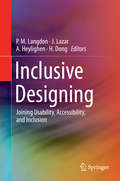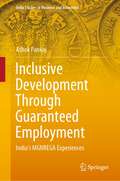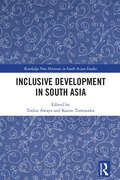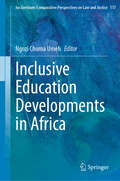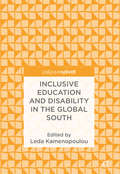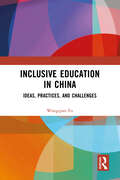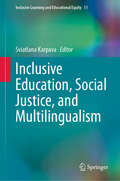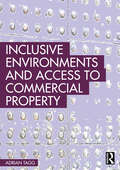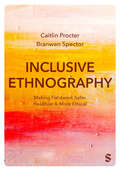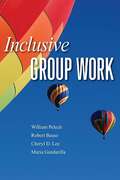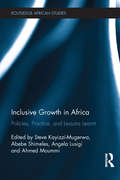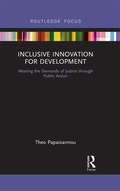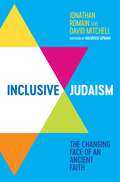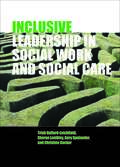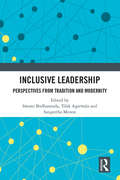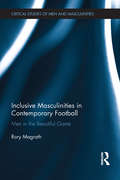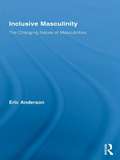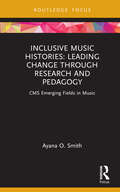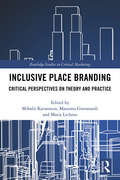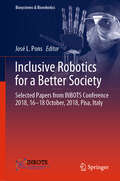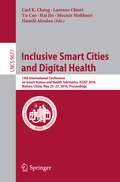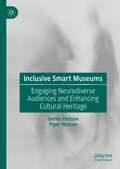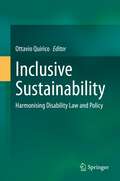- Table View
- List View
Inclusive Designing
by P. M. Langdon J. Lazar A. Heylighen H. Dong'Inclusive Designing' presents the proceedings of the seventh Cambridge Workshop on Universal Access and Assistive Technology (CWUAAT '14). It represents a unique multi-disciplinary workshop for the Inclusive Design Research community where designers, computer scientists, engineers, architects, ergonomists, policymakers and user communities can exchange ideas. The research presented at CWUAAT '14 develops methods, technologies, tools and guidance that support product designers and architects to design for the widest possible population for a given range of capabilities, within a contemporary social and economic context. In the context of developing demographic changes leading to greater numbers of older people and people with disabilities, the general field of Inclusive Design Research strives to relate the capabilities of the population to the design of products. Inclusive populations of older people contain a greater variation in sensory, cognitive and physical user capabilities. These variations may be co-occurring and rapidly changing leading to a demanding design environment. Recent research developments have addressed these issues in the context of: governance and policy; daily living activities; the workplace; the built environment, Interactive Digital TV and Mobile communications. Increasingly, a need has been identified for a multidisciplinary approach that reconciles the diverse and sometimes conflicting demands of Design for Ageing and Impairment, Usability and Accessibility and Universal Access. CWUAAT provides a platform for such a need. This book is intended for researchers, postgraduates, design practitioners, clinical practitioners, and design teachers.
Inclusive Development Through Guaranteed Employment: India’s MGNREGA Experiences (India Studies in Business and Economics)
by Ashok PankajThis book examines the inclusive development experiences and impacts of the Mahatma Gandhi National Rural Employment Guarantee Scheme (MGNREGS). It discusses the theoretical assumptions underlying the inclusive development of Employment Guarantee Scheme (EGS), and draws conclusions based on robust data and real-world experiences with the MGNREGS – which has attracted global attention as India’s most ambitious, rights-based development initiative and most expansive work-based social security measure, the world’s largest public works programme, and people-centric approach to development. The book argues that the Scheme holds vast potential, and, in fact, has made significant contribution to the promotion of livelihoods of the poorest of the poor, but that the weak institutions of local-self-governance, entrusted for implementation of the Scheme, are incapable of exploiting them to the full. It ends with a concrete policy suggestion: the inclusive development experiences gathered with the EGS and presented here could offer a source of policy change in many developing Afro-Asian countries whose situations are similar to India’s, provided the local conditions in the respective country are taken into consideration when designing the EGS. Its significance as a social security measure has increased in post-COVID loss of jobs and livelihoods of the poor.
Inclusive Development in South Asia (Routledge New Horizons in South Asian Studies)
by Toshie Awaya Kazuo TomozawaThis book examines the multi-layered aspects and the complexities of inclusive development in South Asia based on recent data and using innovative methodology. The book offers an analysis of the existing ground realities in terms of economic and inclusive development, presenting relevant discussion and findings. It discusses lower castes, tribes, religious/ethnic minorities, and other socially vulnerable people, as well as gender, rural-urban, and educational disparities in South Asia, and highlights that all these issues are interrelated. Structured in four parts - Spatial Dimensions, Labour and Migration Dimensions, Social Dimensions, and Beyond Inclusion - the chapters present emerging new concepts of related to socio-economic and inclusive development and use effective and valid methods and methodology covering the ground realities-based information and secondary data-based analysis. Evaluating the extent to which inclusive development has been realised in South Asia, the contributors explore a new approach toward the concept of ‘inclusiveness’ through drawing on the experiences of the diverse societies in South Asia. An immensely useful contribution to the analysis of different economic and social issues on different countries in South Asia, focusing on inclusivity, this book will be of interest to researchers working on South Asian Politics and Development Economics.
Inclusive Education Developments in Africa (Ius Gentium: Comparative Perspectives on Law and Justice #117)
by Ngozi Chuma UmehThis book contributes to the discourse on disability in Africa as an issue of systemic exclusion characterized by the discrimination and often complete segregation of persons with disabilities (PWDs) in various African countries. Despite the inclusive promise of the Convention on the Rights of Persons with Disabilities (CRPD) as well as the Protocol to the African Charter on Human and Peoples’ Rights on the Rights of Persons with Disabilities in Africa, the situation has not actually improved for PWDs in Africa. Given the powerful evidence of the devaluation of PWDs in connection with the COVID-19 pandemic, it is high time to reflect on the experiences of persons with disabilities in education, along with other forms of discrimination they encounter. The book’s respective chapters assess how well the existing legal frameworks, policies and practices in most African countries have met the needs for inclusion of children and adults with disabilities. The social and economic rights of persons with disabilities are protected in the constitutions of most countries and enshrined in the normative frameworks that most African leaders have adopted and ratified. These commitments need to be borne in mind when thinking about the present and the future. Inclusive development is an investment and must be viewed as part of a package of reforms that are connected to substantive social protection and improvements in realizing other socio-economic goods. Indeed, a range of alliances are needed to advance the goals of ‘leaving no one behind’, ensuring ‘education for all’, and delivering on the African Union’s call for the development of policies, programmes and requisite budgets for the realization of inclusive education for persons with disabilities.
Inclusive Education and Disability in the Global South
by Leda KamenopoulouThis edited volume examines inclusive education and disability in the global South. Presenting four qualitative research studies conducted in Malaysia, Bhutan, Philippines and Belize, the authors examine the implementation of inclusive education and disabled children’s participation in the education system: contexts on which very little is known. Thus, this book provides a unique opportunity to access rare context-specific information concerning this region of the world; and to reflect on the particular challenges some countries face in the realization of full participation of all children within education. Authored by researchers who are also teaching professionals with experience and understanding of the complexities of the real world, this book reminds us that researchers and policy makers must listen to all voices and perspectives: especially those that have remained silenced and ignored.
Inclusive Education in China: Ideas, Practices, and Challenges
by Wangqian FuBy adopting a comparative approach, this book investigates the philosophy, policy, practices, and challenges of inclusive education in the Chinese contexts, recognizing influences of Chinese culture, such as Confucianism, collectivism, and familism. In the 1980s, the Chinese government promoted a policy named “Learning in Regular Classroom” to ensure educational rights for children with disabilities, which subsequently turned into an inclusive education program in the western sense. Starting from this point, the policy and practice of inclusive education have developed tremendously. To facilitate reflection and future development, this is the latest and most comprehensive attempt at understanding the status quo of inclusive education in China from a variety of perspectives: from early childhood to higher education, from family to schools and communities, from peers to teachers and parents. It also analyzed the unique Chinese philosophy of inclusive education, adding to current debates with a Chinese lens. This book will appeal to academics, students, and practitioners in disciplines such as education, early childhood studies, sociology, social work, social policy, disability studies, and youth studies.
Inclusive Education, Social Justice, and Multilingualism (Inclusive Learning and Educational Equity #11)
by Sviatlana KarpavaThis edited volume delves into the intricate relationships between multilingualism, inclusive education, and social justice. It presents a rich array of interdisciplinary studies that blend both theoretical and practical perspectives. The authors employ a mixed-methods approach to gather and analyze data from a diverse range of populations, including students, teachers, parents, and language policy experts across various educational levels. The book examines the dynamics of bilingual and multilingual classrooms, as well as Content and Language Integrated Learning (CLIL) environments, emphasizing the importance of linguistic and cultural diversity as valuable educational resources. It draws upon a variety of theoretical and practical approaches from applied linguistics, sociolinguistics, language policy, and education, all centered on the benefits of multilingualism, inclusive education, and social justice. The work explores the complexities of multilingualism and multiculturalism and their connections to inclusive education and social justice across different geographic regions and educational settings. It adopts a dual approach, examining both theoretical frameworks and practical realities, by incorporating the voices and perspectives of multiple stakeholders. This diverse range of viewpoints sheds light on the roles of family and school involvement in promoting multilingual education, inclusive practices, and social justice.
Inclusive Environments and Access to Commercial Property
by Adrian TaggThis book presents and examines the challenges and compromises required to deliver inclusivity in the existing commercial-built environment and the socio-economic benefits that could result from successfully delivering it.To illuminate the advantages of an inclusive environment to property owners, investors and service providers, the book covers the history of disability and evolution of the legislation and examines the demographics and types of disability to question the ‘one size’ ‘blanket’ approach that currently exists to providing access. Delving further into the characteristics of the commercial property sectors and individual disability-specific requirements, experienced commercial building surveyor, Adrian Tagg, analyses the contradictions in the existing legislation to establish examples of design compromise or reasonable adjustments. He seeks to contextualise public and commercial attitudes to disability and go further to demystify the term ‘reasonable adjustment’, which is used currently as a tool of compromise in providing access. The aim is to assess disability-specific requirements for access, as well as adopt a simplistic approach to developing access solutions to the existing built environment from a consultancy and user perspective.Ultimately, this publication hopes to promote accessibility and inclusion from the perspective of surveyors, investors and landlords working in commercial property. It is not just targeted at those on undergraduate or post-graduate surveying courses, as well as those early career professionals undertaking their APC or post-graduate qualifications, but also at those owning or delivering goods, services and employment from commercial premises who want to make a difference.
Inclusive Ethnography: Making Fieldwork Safer, Healthier and More Ethical
by Caitlin Procter Branwen SpectorHow can you do ethnographic field research in a safe way for you and the people you work with? In this nuanced, candid book, researchers from across the globe discuss core challenges faced by ethnographers, reflecting on research from preparation to dissemination and how identity interacts with the realities of doing fieldwork. Building on the work of the editors’ The New Ethnographer Project, which has been seeking to change the way ethnographic methods are approached and taught since 2018, the book: Promotes an inclusive approach that invites you to learn from the challenges faced by a diverse range of scholars. Addresses underexplored issues including emotional and physical safety in the face of ableism, homophobia and racism. Challenges assumptions of what it means to produce knowledge by conducting fieldwork. Whether you’re an undergraduate student or an experienced researcher, this book will help you do fieldwork that is safer, healthier and more ethical.
Inclusive Ethnography: Making Fieldwork Safer, Healthier and More Ethical
by Caitlin Procter Branwen SpectorHow can you do ethnographic field research in a safe way for you and the people you work with? In this nuanced, candid book, researchers from across the globe discuss core challenges faced by ethnographers, reflecting on research from preparation to dissemination and how identity interacts with the realities of doing fieldwork. Building on the work of the editors’ The New Ethnographer Project, which has been seeking to change the way ethnographic methods are approached and taught since 2018, the book: Promotes an inclusive approach that invites you to learn from the challenges faced by a diverse range of scholars. Addresses underexplored issues including emotional and physical safety in the face of ableism, homophobia and racism. Challenges assumptions of what it means to produce knowledge by conducting fieldwork. Whether you’re an undergraduate student or an experienced researcher, this book will help you do fieldwork that is safer, healthier and more ethical.
Inclusive Group Work
by William Pelech Robert Basso Cheryl Lee Maria GandarillaInclusive Group Work offers an innovative approach to working with intervention groups and task groups by redefining the concept of diversity and reframing core group work concepts. Appropriate for both undergraduate and graduate courses, this book introduces readers to the foundations of group practice with an emphasis on social justice. The book presents diversity as a relational concept that is at the heart of all group interactions. Individual identity is complex, and in order for all members to be treated equally their individuality must be accepted and respected. Using this framework, the book discusses the values and ethics of social work with groups, explores the stages of group work including planning, and presents both basic and advanced skills such as conflict resolution and the use of self. Theories are put into practice in three chapters of case studies that show in-detail how diversity can be employed as a strength in multiple settings to achieve the wide variety of goals groups pursue. Through this new approach, students and practitioners alike will learn how to harness diversity to engage and maintain participation in inclusive group processes.
Inclusive Growth in Africa: Policies, Practice, and Lessons Learnt (Routledge African Studies)
by Abebe Shimeles Steve Kayizzi-Mugerwa Angela Lusigi Ahmed MoummiInclusive Growth in Africa analyzes the concept of inclusion within the challenges facing Africa’s rapidly growing economies, where rising affluence for some has been accompanied almost everywhere with rising inequality. Using a combination of political economy analyses, sector studies and econometric models, the contributors delve into a range of areas associated to the new realities on the continent. Topics covered include issues of disability, corruption, capital flight, and their implications for economic sustainability. There is also a discussion of the impact on development of dependence on externally determined prices for Africa’s natural resources. Other sector analyses look at agriculture and wind power, and the innovations required to make a difference for the poorer majority. The book comprises of a rich array of essays on socio-economic inclusion in Africa by authors drawn from academia, African think tanks and international organizations. It would be of interest to scholars and students of many disciplines, including: Economics, Sociology, Development Studies, and African Studies.
Inclusive Innovation for Development: Meeting the Demands of Justice through Public Action (Routledge Studies in Development and Society)
by Theo PapaioannouInnovation has the potential to address a number of development challenges such as combating poverty and delivering health services, but all too often technological progress has failed to consider the needs of the poor, and has actually served to increase inequalities, rather than sharing out the benefits of new technologies and economic growth. Inclusive Innovation for Development outlines a theory of justice in innovation, arguing that principles of equity, recognition and participation can guide the direction of contemporary innovation systems towards equalising social relations in the production of knowledge and innovation, and meeting the basic needs of the poor. The book first explores why inclusivity in innovation matters, and how the justice framework can be used to support inclusive innovation. The book then goes on to outline a ‘needs-based’ approach to innovation and development and explains how its principles can be generated through public action. Finally, it asks how we can effectively evaluate inclusive innovation. Drawing on cases from Africa, Latin America and South Asia, this book theorises innovation and justice in political terms, arguing that inclusive innovation is not just a practical necessity but a moral obligation. This book's novel approach to innovation for development will be useful for upper-level students and scholars of development studies, politics, and innovation studies, as well as to local, national and international policy-makers and practitioners dealing with international development and inclusive innovation policies and programmes.
Inclusive Judaism: The Changing Face of an Ancient Faith
by David Mitchell Jonathan RomainOne of the best-kept religious secrets has been the revolution that has been quietly taking place within Judaism over the last two decades, as it has sought to grapple with contemporary issues. These include mixed-faith marriages, gay relationships, women's empowerment, declining numbers, atheism and being trans. It has involved a willingness to abandon biblical laws that conflict with modern values. Most ground-breaking of all, it has meant re-defining what it means to be Jewish in the 21st century.Inclusive Judaism not only uncovers this religion revolution, but presents a challenge to all people of faith on how best to marry tradition and modernity. The book also reflects the soul-searching that has prompted rabbis to chart a new course, both out of principle and as a practical way of rescuing British Jewry from possible collapse if it did not adapt to the new social trends that affect us all.
Inclusive Leadership in Social Work and Social Care
by Sharon Lambley Trish Hafford-LetchfieldSocial work and social care continue to face an unprecedented period of challenge and uncertainty, requiring the development of leadership capabilities at every level of the workforce as well as in the community. This critical and reflexive book looks closely at the pivotal but demanding role that leadership and management play in promoting social work and social care. It focuses particularly on the value that is potentially created when the human relationships between people delivering and people using public services are effective, and the conditions are present to nourish confidence, inspire self-esteem, unlock potential and erode inequality. Aimed at new, aspiring and experienced managers, and senior practitioners, it draws on a range of disciplines not typically found in social work and social care and encourages readers to broaden their examination of leadership in areas such as the design of organisations, the role of service users in leadership practice and the phenomena of dignity within the context of organisational culture and dignity.
Inclusive Leadership: Perspectiives from Tradition and Modernity
by Sangeetha Menon Swami Bodhananda Tilak AgerwalaThis book reflects on the models of leadership espoused by ancient Indic traditions, in particular the Advaita Vedanta tradition. Focusing primarily on the Rajarshi – ‘the philosopher king’ – the essays in this volume showcase how using these models in contemporary society could lead to the creation of self-aware and empathic leaders and an inclusive society. The book explores examples of the Brahmarshi, or the wise scholar; Rajarshi, or the wise ruler; and Devarshi, or the visionary, to bring together all the ideal virtues of inclusive leadership in the current cultural and political space. The essays in the volume adopt a critical sociological, philosophical and management lens to analyse Indic traditions and dharmic concepts. The volume uses concepts such as dharma, karma and, yoga along with organisational psychology, technology, and management, to arrive at the concept of transcendental leadership. It theorises new definitions of the Rajarshi ideal, which can be used towards public service, social transformation and self-discovery. The volume will be useful for scholars and academics interested in Indic philosophies of leadership and governance, sociology, and social and political inclusivity. It will also be useful for readers in public administration, business and management.
Inclusive Masculinities in Contemporary Football: Men in the Beautiful Game (Critical Studies of Men and Masculinities)
by Rory MagrathFootball has traditionally been an institution hostile toward sexual minorities. Boys and men in the sport have deployed high levels of homophobia for multiple reasons. However, the ground-breaking research within this book shows that intolerant attitudes toward gay men are increasingly being challenged. Based on unprecedented access to Premier League academies, Inclusive Masculinities in Contemporary Football: Men in the Beautiful Game explores these changing attitudes toward homophobia in football today. Revealing a range of masculine identities never before empirically measured at this level of football, this book discusses the implications for the complex and enclosed structures of professional sport, and extends our understanding of contemporary masculinity. It also offers fresh insights to the importance of "banter" in the development of relationships and identities. This culture of banter often plays a paradoxical role, both facilitating and disrupting friendships formed between male footballers. As the first title in the Routledge Critical Studies of Men and Masculinities Series, this book is fascinating reading for all students and scholars interested in football and the study of gender, sexuality and the sociology of sport.
Inclusive Masculinity: The Changing Nature of Masculinities (Routledge Research in Gender and Society)
by Eric AndersonDrawing on qualitative studies of teamsport athletes and fraternity members, this book describes the rapidly changing world of masculinities among men in both the United States and Great Britain. As cultural homophobia decreases, university-aged men are influenced to construct a softer version of masculinity – one that is not predicated in homophobia. Inclusive Masculinity shows that today's youth express decreased sexism, racism and masculine bullying. As Eric Anderson demonstrates, men who value inclusive masculinities are also shown to be more likely to bond in emotional relationships with other men and to embrace a variety of behaviors once coded as feminine, including certain same-sex sexual behaviors. Now available in paperback, this groundbreaking analysis of masculinity and young men will be of interest to students and faculty members within Sociology, Gender Studies, and Sport Studies.
Inclusive Music Histories: CMS Emerging Fields in Music (CMS Emerging Fields in Music)
by Ayana O. SmithInclusive Music Histories: Leading Change through Research and Pedagogy models effective practices for researchers and instructors striving either to reform music history curricula at large or update individual topics within their classes to be more inclusive. Confronting racial and other imbalances of Western music history, the author develops four core principles that enable a shift in thinking to create a truly intersectional music history narrative and provides case studies that can be directly applied in the classroom. The book addresses inclusivity issues in the discipline of musicology by outlining imbalances encoded into the canonic repertory, pedagogy, and historiography of the field. This book offers comprehensive teaching tools that instructors can use at all stages of course design, from syllabus writing and lecture planning to discussion techniques, with assignments for each of the subject matter case studies. Inclusive Music Histories enables instructors to go beyond token representation to a more nuanced music history pedagogy.
Inclusive Music Histories: CMS Emerging Fields in Music (CMS Emerging Fields in Music)
by Ayana O. SmithInclusive Music Histories: Leading Change through Research and Pedagogy models effective practices for researchers and instructors striving either to reform music history curricula at large or update individual topics within their classes to be more inclusive. Confronting racial and other imbalances of Western music history, the author develops four core principles that enable a shift in thinking to create a truly intersectional music history narrative and provides case studies that can be directly applied in the classroom. The book addresses inclusivity issues in the discipline of musicology by outlining imbalances encoded into the canonic repertory, pedagogy, and historiography of the field. This book offers comprehensive teaching tools that instructors can use at all stages of course design, from syllabus writing and lecture planning to discussion techniques, with assignments for each of the subject matter case studies. Inclusive Music Histories enables instructors to go beyond token representation to a more nuanced music history pedagogy.
Inclusive Place Branding: Critical Perspectives on Theory and Practice (Routledge Studies in Critical Marketing)
by Mihalis Karavatzis Massimo Giovanardi Maria LichrouPlace branding is often a response to inter-place competition and discussed as if it operated in a vacuum, ignoring the needs of local communities. It has developed a set of methods – catchy slogans, colourful logos, ‘star-chitects’, bidding for City of Culture status etc. – that are applied as quick-fix solutions regardless of geographical and socio-political contexts. Critical views of place branding are emerging which focus on its unexplored consequences on the physical and social fabric of places. These more critical approaches reveal place branding as an essentially political activity, serving hidden agendas and marginalizing social groups. Scholars and practitioners can no longer ignore the need for more responsible and socially sensitive approaches to cater for a wider range of stakeholders, and which fully acknowledge the importance of resident participation in decision-making. The contributions in this innovative book set out to introduce new critical ways of thinking around place branding and practices that encourage it to be more inclusive and participatory. It will be of interest to researchers and advanced students of branding, critical marketing, and destination marketing as well as critical tourism and environmental design.
Inclusive Robotics for a Better Society: Selected Papers from INBOTS Conference 2018, 16-18 October, 2018, Pisa, Italy (Biosystems & Biorobotics #25)
by José L. PonsThe book reports on advanced topics in interactive robotics research and practice; in particular, it addresses non-technical obstacles to the broadest uptake of these technologies. It focuses on new technologies that can physically and cognitively interact with humans, including neural interfaces, soft wearable robots, and sensor and actuator technologies; further, it discusses important regulatory challenges, including but not limited to business models, standardization, education and ethical–legal–socioeconomic issues. Gathering the outcomes of the 1st INBOTS Conference (INBOTS2018), held on October 16–20, 2018 in Pisa, Italy, the book addresses the needs of a broad audience of academics and professionals working in government and industry, as well as end users. In addition to providing readers with detailed information and a source of inspiration for new projects and collaborations, it discusses representative case studies highlighting practical challenges in the implementation of interactive robots in a number of fields, as well as solutions to improve communication between different stakeholders. By merging engineering, medical, ethical and political perspectives, the book offers a multidisciplinary, timely snapshot of interactive robotics.
Inclusive Smart Cities and Digital Health
by Yu Cao Mounir Mokhtari Hai Jin Carl K. Chang Lorenzo Chiari Hamdi AloulouThis book constitutes the proceedings of the 14th International Conference on Smart Homes and Health Telematics, ICOST 2016, held in Wuhan, China, in May 2016. The 39 regular papers, 5 short papers and 1 poster paper included in this volume were carefully reviewed and selected from 83 submissions. They were organized in topical sections named: smart homes, smart urban spaces and new assistive living space concepts in the smart city; e-health for future smart cities; context awareness and autonomous computing; home networks and residential gateways; middleware support for smart homes and health telematic services; e-health and chronic disease management; e-health technology assessment and impact analysis; tele-assistance and tele-rehabilitation; modeling of physical and conceptual information in intelligent environments; medical big data collection, processing and analysis; human machine interfaces; wearable sensors and continuous health monitoring; social, privacy and security issues; mobile health services; and smart rehabilitation technologies.
Inclusive Smart Museums: Engaging Neurodiverse Audiences and Enhancing Cultural Heritage
by James Hutson Piper HutsonThis book delves into the significant and timely intersection of cultural heritage, neurodiversity, and smart museums, exploring how various immersive techniques can create more inclusive and engaging heritage experiences for neurodiverse audiences. By focusing on these three aspects, the book aims to contribute significantly to the fields of cultural heritage, neuro-inclusivity, and smart museums, offering practical solutions and examples for heritage professionals and researchers. The book highlights the importance of preserving and enhancing cultural heritage by incorporating immersive technologies and inclusive practices that cater to the needs of neurodiverse audiences. It emphasizes the need for museums and heritage sites to be more inclusive and accessible for neurodivergent individuals, showcasing best practices and innovative techniques to engage this audience effectively.
Inclusive Sustainability: Harmonising Disability Law and Policy
by Ottavio QuiricoIn light of the third-generation concept of ‘inclusive sustainability’, the volume explores the architecture of global disability governance and its degree of harmonisation. The book integrates socio-cultural, economic, political and legal analyses from an international and comparative perspective. The first part of the volume outlines a tripartite systematisation of disability rights for States and non-state persons. In light of essential economic considerations, the second part explores the relationship between disability and specific fundamental rights and regimes, particularly the rights to life, health, education, work and participation. The third part takes an institutional approach and focuses on the way in which the UN and regional organisations regulate disability (rectius, different ability).
